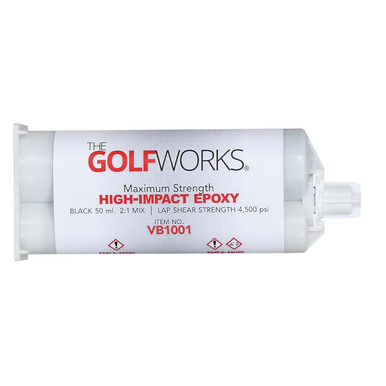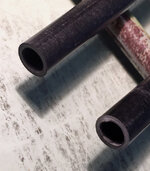jchamwv
FNG
i use the Bob Smith MAXI-CURE and haven't had an issue. As others have said, prep is the key.
Follow along with the video below to see how to install our site as a web app on your home screen.
Note: This feature may not be available in some browsers.
Just like the Loctite issues we hear about, likely operator errorOr is it operator error?
Same for me. I’m pretty sure Kimsha is what Iron Will sells for hot melt as well. I’ve used both and haven’t had issues.I have been using kimsha hotmelt for 3-4 years and I don’t think I have had one come loose yet. I do a little extra prep on them but it’s been working great.
What about Locktite? Did they make some bad batches of epoxy?Just like the Loctite issues we hear about, likely operator error
I'm joking (sort of) about the scope base/ring issues where some can't get Loctite thread locker to work properlyWhat about Locktite? Did they make some bad batches of epoxy?
OK i gotcha , i try n make sure they are clean before i epoxy them. I really think the bulbed style field points aint helping. So i may look to change those too , even though they r nice for 3D. Dont penetrate as farDang, I've done dozens of arrows and never had a HIT pull out. I use the Easton epoxy. I usually wipe the inside out with a Q tip then start seating the hits.
Sent from my SM-S918U using Tapatalk
Just starting the discussion to see if others have had a similar experience. I am always first to blame myself the operator before the equipment! hahaCmon guys, Do you really think Easton would supply the wrong epoxy?
Or is it operator error?
Ya, except Easton epoxy was most likely designed to work for Easton arrows. I've found that most arrow manufacturer's arrows are a little different in how well they hold onto inserts even given the exact same prep process.Cmon guys, Do you really think Easton would supply the wrong epoxy?
This is the stuff. I bought a few of the burst pouches so they wouldn't go bad between uses.Good timing on this thread. I have Rip TKO's with the Iron Will Hit inserts. Bought the install kit (wire brush, etc) & Easton epoxy with them. Went through the whole prepping process & had a few pull out last fall. Just started shooting my bow again last week & the first 2 arrows did the same thing. Was just asking around if others had ever had this issue. Guess I'll get some of the high impact epoxy & try it

It's all good.

10-4 Yeah i have heard that about Acetone. Ill steer clear of thatIt's all good.
FWIW, I talked to the Easton engineers at the industry show many years ago about Axis shaft assembly. There can be a little bit of residual stuff on shaft and insert that can cause us problems. They recommended cleaning with 90% Alcohol. They said Acetone can degrade the carbon shaft. They said it's important to let the components dry after cleaning.
The epoxy bond of insert and shaft is an important factor. They want a thick epoxy with an even coat to transfer the straightness of the shaft to the insert. That strong bond is critical to the impact strength, we don't get that with hotmelt or weaker glue.
A light twist on the insert with 220 sandpaper can't hurt with that bond.
IME, Milling the ends of the carbon shaft not only makes the whole system straighter but also stronger. Arrows right off the saw look like they have split ends. Squaring them on a jig with fine sandpaper makes for a better seating of BH's on the shoulder of the shaft.
View attachment 825926
Heres a cell phone pic of a squared shaft (L) and an arrow right off the saw. Under a microscope the difference is glaring but even with the naked eye you can see the difference. This perfect connection improves everything.
A guy thats decent with a carpenter square and table saw can replicate this 20 yr old jig above.
No surprise really, talk to any machinist and you will hear that a perfect fit between two components is critical. It's literally like having your Lug nuts tight with the wheel seated tight against the hub. Sure you can drive your truck otherwise but you won't get the same performance.10-4 Yeah i have heard that about Acetone. Ill steer clear of that
Thanks for illustrating that pic too. I think its the little details like this that make all the difference. I do make sure to square every arrow i cut. Perfect example right here!
Circling back as i am finally tuned up and need to rebuild some more arrows. This was so helpful thanks man.The closest I could find to a real number for the easton hit epoxy last year when i really dug into insert epoxy issues was in the 2000-2500 psi range (I was not able to replicate this information today, so going off memory). Golf club epoxies ranged from 4000-6000 psi.
On a hit insert where you only have 0.03-0.1 in^2 of surface area to engage, the difference in absolute shear strength between a 2000-2500 psi epoxy and a 4000-6000 psi epoxy is noteworthy, and in my experience, it is the difference between inserts remaining in the shaft, and inserts spinning free.
Rip tkos built by me:
process:
square arrows
22 cal brass bore brush, 10+ strokes and twists
clean inside of the shaft with acetone soaked q-tips until clean, typically 5+ qtips per shaft
wipe inside of shaft with both ends of a dry q-tip
clean inserts with acetone
allow everything to dry
install with easton epoxy per the lancaster archery youtube video on hit installation
using this process, 11 of 12 inserts twisted out within 2 weeks, the 12th one lasted until week 3
Using the exact same process but substituting in high impact shafting epoxy, 0 loose inserts in over 20 months of continuous use.
rip tko's built by adams archery
20 of 21 hit inserts twisted out the first time a field point was installed
redone using the above process with high impact shafting epoxy, zero inserts have spun free in 12 months of (admittedly light) use. these are my broadhead and hunting arrows, the 3 that have been recovered after kills have been returned to service without issues, 1 is still lost on the mountain somewhere.
Axis arrows seem to have a more porous structure that may allow increased adhesion over what is possible with the rip tko, but for the rip tko application, the easton hit epoxy has proven that it is not up to the task. This is a well known issue, with multiple people posting about issues over the past handful of years. Miraculously, switching to stronger epoxy eliminates the issue in all cases.
I am about to rebuild some arrows (finally). Any luck? You find any other epoxy that works better?Good timing on this thread. I have Rip TKO's with the Iron Will Hit inserts. Bought the install kit (wire brush, etc) & Easton epoxy with them. Went through the whole prepping process & had a few pull out last fall. Just started shooting my bow again last week & the first 2 arrows did the same thing. Was just asking around if others had ever had this issue. Guess I'll get some of the high impact epoxy & try it
